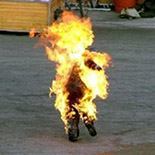
 Tarek al-Tayeb Mohamed Bouazizi (March 29, 1984 – January 4, 2011) was a Tunisian street vendor who set himself on fire on December 17, 2010, in protest of the confiscation of his wares and the harassment and humiliation that he reported was inflicted on him by a municipal official and her aides.
Tarek al-Tayeb Mohamed Bouazizi (March 29, 1984 – January 4, 2011) was a Tunisian street vendor who set himself on fire on December 17, 2010, in protest of the confiscation of his wares and the harassment and humiliation that he reported was inflicted on him by a municipal official and her aides.
His act became a catalyst for the Tunisian Revolution and the wider Arab Spring, inciting demonstrations and riots throughout Tunisia in protest of social and political issues in the country. The public’s anger and violence intensified following Bouazizi’s death, leading then-President Zine El Abidine Ben Ali to step down on January 14, 2011, after 23 years in power.
The success of the Tunisian protests inspired protests in several other Arab countries, plus several non-Arab countries. The protests included several men who emulated Bouazizi’s act of self-immolation, in an attempt to bring an end to their own autocratic governments. Those men and Bouazizi were hailed by Arab commentators as “heroic martyrs of a new Middle Eastern revolution”.
In 2011, Bouazizi was posthumously awarded the Sakharov Prize jointly along with four others for his and their contributions to “historic changes in the Arab world”. The Tunisian government honored him with a postage stamp. The Times of the United Kingdom named Bouazizi as “Person of 2011”.